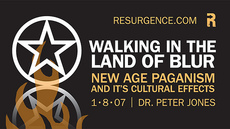When most people think of the doctrine of predestination, they tend to think of a revision of the children’s game Duck, Duck, Goose. Instead, it’s Duck, Duck, Damned where God picks some people to favor and others to fry while Calvinists dance around yelling Romans 9:20 to anyone who protests. Yet the Bible’s teaching on the issue is very important, difficult, and encompasses nearly every other area of primary theology. Last Sunday I preached the third sermon in our Religion Saves and Nine Other Misconceptions series. It addressed the #7 question and the issue of predestination. For those who are unaware, we tried an experiment by opening up a section of marshillchurch.org for people to post any question, make comments about posted questions, and vote up to ten times a day for their favorite question. In the end, 893 questions were asked, 5,524 comments were made, and 343,203 votes were cast. The top nine questions have now been chosen and the preaching series is underway with the ensuing book due out next year with my friends at Crossway. Anyways, the #7 question was "Why does an all loving, all knowing, and all sovereign God will into creation people He foreknows will suffer eternal condemnation? Why does Romans 9:20 feel like a cop-out answer?" To be honest, this sermon took an incredible number of hours of preparation. I have studied the issue many times before, but in an effort to do the best job I could, I went back and reread everything I had read previously and added to that an enormous stack of new books and commentaries. If I stacked them all up they would easily be more than ten feet high. I know folks have a lot of questions on the issue and the chapter for the book based on this series should be of some help. In the meantime, I thought I would answer some common questions, provide some Scripture for personal study, and recommend some audio and print resources that supplement the lengthy sermon we posted online and the questions I answered on the subject from our text messaging experiment at the 8:30 pm service. PART 1 – Answers to Common Questions about Predestination What is the order of salvation? In an effort to simplify much of this material it will be helpful to note the order of salvation, or as the theologians call it the ordo salutis. In it we can trace the process of a Christian’s relationship with God:
- Election (God’s sovereign choice)
- Gospel call (proclamation of Jesus)
- Regeneration (born again, new heart)
- Conversion (faith and repentance from the new heart)
- Justification (legal standing before God)
- Adoption (membership in God’s family the church)
- Sanctification (ongoing growth in holiness like Jesus)
- Perseverance (ongoing loving relationship with Jesus)
- Death (soul goes to be with Jesus)
- Glorification (resurrection body like Jesus)
- "[He] chose us in him before the foundation of the world" (Ephesians 1:4).
- ". . . share in suffering for the gospel by the power of God, who saved us and called us to a holy calling, not because of our works but because of his own purpose and grace, which he gave us in Christ Jesus before the ages began" (2 Timothy 1:8–9).
- ". . . and all who dwell on earth will worship it, everyone whose name has not been written before the foundation of the world in the book of life of the Lamb that was slain" (Revelation 13:8).
- "The beast that you saw was, and is not, and is about to rise from the bottomless pit and go to destruction. And the dwellers on earth whose names have not been written in the book of life from the foundation of the world will marvel to see the beast, because it was and is not and is to come" (Revelation 17:8).
- "I have been found by those who did not seek me; I have shown myself to those who did not ask for me" (Romans 10:20).
- "But God chose what is foolish in the world to shame the wise; God chose what is weak in the world to shame the strong; God chose what is low and despised in the world, even things that are not, to bring to nothing things that are, so that no human being might boast in the presence of God" (1 Corinthians 1:27–29).
- "In love he predestined us" (Ephesians 1:4–5).
- "I am speaking the truth in Christ—I am not lying; my conscience bears me witness in the Holy Spirit— that I have great sorrow and unceasing anguish in my heart. For I could wish that I myself were accursed and cut off from Christ for the sake of my brothers, my kinsmen according to the flesh. They are Israelites, and to them belong the adoption, the glory, the covenants, the giving of the law, the worship, and the promises. To them belong the patriarchs, and from their race, according to the flesh, is the Christ who is God over all, blessed forever. Amen" (Romans 9:1–5).
- "Brothers, my heart's desire and prayer to God for them is that they may be saved" (Romans 10:1).
- "For those whom he foreknew he also predestined to be conformed to the image of his Son, in order that he might be the firstborn among many brothers" (Romans 8:29).
- "For we know, brothers loved by God, that he has chosen you, because our gospel came to you not only in word, but also in power and in the Holy Spirit and with full conviction" (1 Thessalonians 1:4–5).
- "Paul, a servant of God and an apostle of Jesus Christ, for the sake of the faith of God's elect and their knowledge of the truth, which accords with godliness" (Titus 1:1).
- Augustinian – single destination
- Calvinism – double destination
- "For many are called, but few are chosen" (Matthew 22:14).
- "I am not speaking of all of you; I know whom I have chosen. But the Scripture will be fulfilled, ‘He who ate my bread has lifted his heel against me’" (John 13:18).
- "For false christs and false prophets will arise and perform great signs and wonders, so as to lead astray, if possible, even the elect" (Matthew 24:24).
- "And he will send out his angels with a loud trumpet call, and they will gather his elect from the four winds, from one end of heaven to the other" (Matthew 24:31).
- "And will not God give justice to his elect, who cry to him day and night? Will he delay long over them?" (Luke 18:7).
- "For as the Father raises the dead and gives them life, so also the Son gives life to whom he will" (John 5:21).
- "All that the Father gives me will come to me, and whoever comes to me I will never cast out. For I have come down from heaven, not to do my own will but the will of him who sent me. And this is the will of him who sent me, that I should lose nothing of all that he has given me, but raise it up on the last day" (John 6:37–39).
- "I am not speaking of all of you; I know whom I have chosen" (John 13:18).
- "You did not choose me, but I chose you and appointed you that you should go and bear fruit and that your fruit should abide, so that whatever you ask the Father in my name, he may give it to you" (John 15:16).
- "If you were of the world, the world would love you as its own; but because you are not of the world, but I chose you out of the world, therefore the world hates you" (John 15:19).
- ". . . do whatever your hand and your plan had predestined to take place" (Acts 4:28).
- "The God of this people Israel chose our fathers and made the people great during their stay in the land of Egypt, and with uplifted arm he led them out of it" (Acts 13:17).
- "And when the Gentiles heard this, they began rejoicing and glorifying the word of the Lord, and as many as were appointed to eternal life believed" (Acts 13:48).
- "For the wages of sin is death, but the free gift of God is eternal life in Christ Jesus our Lord" (Romans 6:23).
- "For those whom he foreknew he also predestined to be conformed to the image of his Son, in order that he might be the firstborn among many brothers. And those whom he predestined he also called, and those whom he called he also justified, and those whom he justified he also glorified" (Romans 8:29–30).
- "Who shall bring any charge against God's elect? It is God who justifies" (Romans 8:33).
- ". . . though they were not yet born and had done nothing either good or bad—in order that God's purpose of election might continue, not because of works but because of his call—she was told, ‘The older will serve the younger.’ As it is written, ‘Jacob I loved, but Esau I hated.’ What shall we say then? Is there injustice on God’s part? By no means! For he says to Moses, ‘I will have mercy on whom I have mercy, and I will have compassion on whom I have compassion.’ So then it depends not on human will or exertion, but on God, who has mercy. For the Scripture says to Pharaoh, ‘For this very purpose I have raised you up, that I might show my power in you, and that my name might be proclaimed in all the earth.’ So then he has mercy on whomever he wills, and he hardens whomever he wills" (Romans 9:11–18).
- "So too at the present time there is a remnant, chosen by grace" (Romans 11:5).
- "What then? Israel failed to obtain what it was seeking. The elect obtained it, but the rest were hardened" (Romans 11:7).
- "God chose what is foolish in the world to shame the wise; God chose what is weak in the world to shame the strong; God chose what is low and despised in the world, even things that are not, to bring to nothing things that are" (1 Corinthians 1:27–28).
- "Blessed be the God and Father of our Lord Jesus Christ, who has blessed us in Christ with every spiritual blessing in the heavenly places, even as he chose us in him before the foundation of the world, that we should be holy and blameless before him. In love he predestined us for adoption as sons through Jesus Christ, according to the purpose of his will, to the praise of his glorious grace, with which he has blessed us in the Beloved. In him we have redemption through his blood, the forgiveness of our trespasses, according to the riches of his grace, which he lavished upon us, in all wisdom and insight making known to us the mystery of his will, according to his purpose, which he set forth in Christ as a plan for the fullness of time, to unite all things in him, things in heaven and things on earth. In him we have obtained an inheritance, having been predestined according to the purpose of him who works all things according to the counsel of his will, so that we who were the first to hope in Christ might be to the praise of his glory" (Ephesians 1:3–11).
- "For it has been granted to you that for the sake of Christ you should not only believe in him but also suffer for his sake" (Philippians 1:29).
- "Put on then, as God’s chosen ones, holy and beloved, compassion, kindness, humility, meekness, and patience" (Colossians 3:12).
- "For we know, brothers loved by God, that he has chosen you, because our gospel came to you not only in word, but also in power and in the Holy Spirit and with full conviction" (1 Thessalonians 1:4–5).
- "But we ought always to give thanks to God for you, brothers beloved by the Lord, because God chose you as the firstfruits to be saved, through sanctification by the Spirit and belief in the truth" (2 Thessalonians 2:13).
- "Therefore I endure everything for the sake of the elect, that they also may obtain the salvation that is in Christ Jesus with eternal glory" (2 Timothy 2:10).
- "Paul, a servant of God and an apostle of Jesus Christ, for the sake of the faith of God's elect and their knowledge of the truth, which accords with godliness" (Titus 1:1).
- "As you come to him, a living stone rejected by men but in the sight of God chosen and precious" (1 Peter 2:4).
- "But you are a chosen race, a royal priesthood, a holy nation, a people for his own possession, that you may proclaim the excellencies of him who called you out of darkness into his marvelous light" (1 Peter 2:9).
- "Peter, an apostle of Jesus Christ, To those who are elect exiles of the dispersion" (1 Peter 1:1).
- "Therefore, brothers, be all the more diligent to make your calling and election sure, for if you practice these qualities you will never fall" (2 Peter 1:10).
- Reformed Doctrine of Predestination by Loraine Boettner is a classic work available for free here.
- Audio, video, and notes from Dr. Bruce Ware’s sessions at the 2007 Resurgence Conference "Where the Hand of God and Hands of Men Meet." (There is one session on Open Theism, one session on Classic Arminianism, and one session on God's Providence/Reformed Tradition.)




